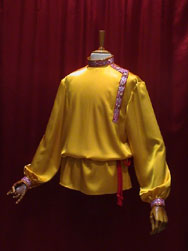 |
 |
||||
 |
|||||
Sales of theatrical clothes and disguises (jabot shirts with or without lace, cape, hats, wigs and Venetian masks, vests and old trousers) for all public, weddings, fancy dress, costumers, and public spectacles.
Also discover on our website all personal achievements, available from stock in our warehouse in Paris.
On our WEB site, you can :
- To buy by correspondence
via this WEB site
and even
CONTACT : THEATRHALL
Phone calls to France: + 33.1.43.26.64.90 (after 15h)
N° VAT Intracomm. - SIRET - APE - RIB - General Conditions of Sale
teatral teatrall teatrale teatrales téâtral
téâtrall téâtrale téâtrales theatrical
théâtrall theatrical theatrical theatrical theatrall theatrical
theatrical theater hall theater all teatrhall teatre hall
shirt Russian shirts Russian Russian trousers
Russia
An article of Wikipédia, the free encyclopedia.
To go to: navigation, to Search for
(ru)
Rossiiskaïa Fédératsiya
Federation of Russia (fr)
(Details) (Details)
National motto: no
Languages official Russian 1
Moscow capital
55° 45' N, 37° 42' E
Bigger Moscow city
Government
- President
- Prime minister federal Republic
Vladimir Poutine
Mikhaïl Fradkov
Surface
- Total
- Water (%) Classified 1st
17 075 200 km²
0,5%
Population
- Total (2006)
- Density Classified 8th
142 400 000 hab.
8,3 hab./km²
Independence
- End of the USSR
December 25, 1991
Gentilé Russian
Currency Rouble (RUB2)
Time zone UTC +2 to +12
National anthem patriotic Song
Domain internet .ru 3
Indicative
telephonic + 7
1 of numerous other languages also has an official statute in some of
the subdivisions of Russia.
2 RUR are obsolete.
3 .su (Union Soviet) is also reserved and is used by the Federation
of Russia.
Russia or Federation of Russia (in Russian / Rossiya or / Rossiïskaïa Fédératsiïa) is
the vast country to the world and spreads on two continents: Europe
and Asia.
Russia is founding member of the Community of the independent States
(CEI), permanent member of the Security council of the UNO and member
of the G8 as well as the Council of Europe.
Russia is considered as the extension of the soviet union, of which
she is the heiress on the plans diplomatic, cultural, military, historic
and geographical.
Russia possesses terrestrial borders with 14 countries (in the inverse
order of the needles of a watch, while leaving from northernmost): Norway,
Finland, Estonia, Latvia, Belarus, Lithuania, Poland, Ukraine, Georgia,
Azerbaijan, Kazakhstan, China, Mongolia and North Korea. His/her/its
coasts spread from the Arctic ocean to the north to the Pacific Ocean
to the East. She/it is also bathed by the Baltic sea, the Black sea,
the Caspian sea, the White sea, the sea of Barents, the sea of Kara,
the sea of Laptev, the sea of Siberia, the sea of Okhotsk, the sea of
Bering and the sea of Japan.
Summary [to conceal]
1 history
2 political
3 subdivisions
3.1 cities in Russia
4 geography
5 economy
6 military strengths
7 demography
8 culture
8.1 religions
9 education
10 agriculture
11 to see also
11.1 related articles
11.2 external ties
History [to modify]
To see the article History of Russia.
The Rous' of Kiev is the first Slavic federal State. Prince Vladimir
of Kiev was baptized in 988 in the Byzantine tradition. He/it begins
then to unify the country. The decay of the state of Kiev will give
birth in Ukraine, Belarus and Russia.
Of the XIIIème in the XVIIIème century, Russia essentially
spread from Moscow and at the expense of the Horde of Mongol gold, the
Ottoman empire and Cossack of the East.
In February 1917, the emperor Nicolas II abdicates; Russia becomes a
bourgeois Republic, the temporary government is constituted then, presided
by prince Kerenski. In October 1917, following one revolution, the Bolsheviks
led by Lenin take the power in St Petersburg (then fundamental of Russia).
A civil war opposes during 3 years the white Russians (republican or
monarchist) to the red Russians (Communist). After their victory, the
Bolsheviks institute the union of the soviet socialist republics.
In 1990, the USSR collapses and republics that constituted it take their
independence from 91. Since, Russia is a democracy and his/her/its economy
is liberal.
Flag of the RSFSRLors of the soviet period (1917-1991)
Russia carried the name of soviet federative socialist Republic of Russia
(RSFSR), she was one of the 15 Republics that composed the USSR
To see also: List of the monarches of Russia; Union of the soviet socialist
republics
Politics [to modify]
Russia portal
To see the Political article in Russia.
Régime: Federal republic to strong presidential régime.
Chief of the state (elected to the direct universal suffrage for a mandate
of 4 years renewable once): Vladimir Poutine since 1999, by interim,
then elected in 2000 and reelected in 2004.
The legislative power is represented by the composed federal assembly
by
The Douma (?there?a) or, more precisely Douma of state, formed by 450
deputies elected to the direct universal suffrage for 4 years. The Douma
is presided by Boris Gryzlov.
The Council of the Federation formed of 178 representatives
of the Topics of the Federation (local collectivities), named often
"senators." (to see Russie#Subdivisions). The Council of the
Federation is presided by Sergueï Mironov.
To see also: Géostratégie of Russia
Subdivisions [to modify]
Detailed articles: Subdivisions of Russia ~ federal Districts of Russia
~ federal Topics of Russia ~ Republics of Russia ~ Oblasts of Russia
~ Krais of Russia ~ autonomous Districts of Russia ~ autonomous Oblast
of Russia ~ federal Cities of Russia
The Federation of Russia is constituted of 88 equal topics in right:
21 republics,
48 oblasts (regions),
7 kraïs (territories),
9 okrougs (districts),
2 cities of federal importance (Moscow and St Petersburg),
1 autonomous oblast (autonomous oblast of the Jews, said "Birobidjan",
of the name of his/her/its capital,).
Strong of his/her/its 128 nationalities, the Federation cut its territory
in numerous legal parcels: according to the nationality for republics
or okroug, for administrative reasons for the kraïs and the oblasts.
The Birobijan keeps a particular statute, he had been foreseen by Stalin
like an earth of welcome of the Jewish of USSR.
Each of the 88 topics sends to the Council of the Federation two representatives.
Every topic has its own legislation (a Constitution for republics and
a Statute for the regions, territories, districts and cities). The Douma
represents the population of the Federation.
Cities in Russia [to modify]
Panorama of the embankment of Kremlin with the silhouette of the Cathedral
of the Christ Sauveur (on the left) to See the article Cities of Russia.
Moscow, the capital of Russia
St Petersburg, formerly Petrograd, then Léningrad (until 1991)
Iekaterinbourg, formerly Sverdlovsk
Grozny
Iaroslavl
Irkoutsk
Kaliningrad formerly Königsberg
Kazan
Kirov
Nijni-Novgorod formerly Gorkii
Novosibirsk
Oufa
Rostov-on-the-Don
Samara formerly Kouibychev
Togliatti formerly Stavropol on the Volga
Vladivostok
Volgograd formerly Stalingrad and Tsaritsino

